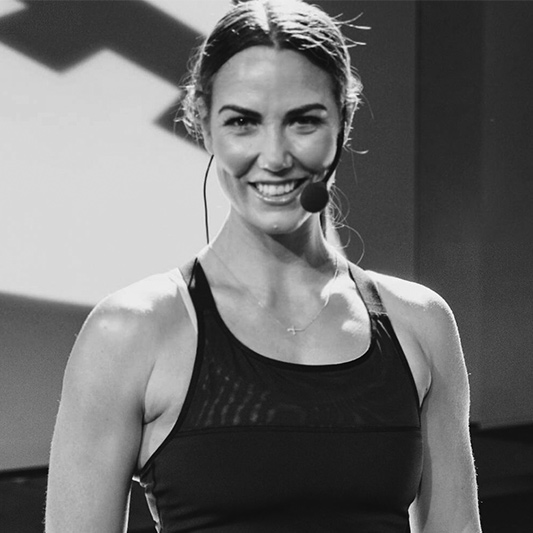This syndrome is the Female Athlete Triad, or F.A.T, and it involves an imbalance between energy in (food) with energy out (exercise), a disturbed or non-existent menstrual cycle, and weakened bones.
It is a triple threat. I know this because I experienced it all first hand.
What leads to F.A.T.
Those at risk of F.A.T. are those who exercise intensely and play competitive sports … and surprisingly, those who go to the gym. Yes, go to the gym.
It’s easier to understand how professional sportswomen might be at risk of F.A.T. They are put under pressure to look a certain way to be selected, or make a weight class – and as a result they will do all it takes to improve their performance, selection or ranking. Exercise duration or intensity will increase, and calories consumed will be cut. A drastic imbalance of energy in versus energy out can develop.
Some female gym-goers share such drive, doing all they can to be fitter, stronger and (maybe in their perception) look better. On the outside these women can simply seem passionate about their gym performance. On the inside they can be highly competitive (not necessarily with others but with themselves), have low self-esteem, type A personalities and a tendency towards perfectionism.
I was one of these women. I was an exercise addict, in the gym ALL THE TIME.

The worst advice I ever got
The worst advice I ever got was from a coach when I was an athlete in a performance sport: "Lose weight."
Crazy, right? As athletes, we need the muscle mass to perform athletically – it is a good thing. However, when under pressure to make a weight or look “slim” by cutting calories, the muscle is generally first to go. We lose the tissue that drives our movement performance, not the fat.
The imbalance of nutrients, combined with stress, can disrupt the hormones that control the menstrual cycle. Periods can be missed or so light they are barely noticed, initially randomly, but over time and as hormone levels sink lower, more frequently. It’s called amenorrhea and it becomes serious when menstruation does not come at all for over three months. This is considered Factor 2 in F.A.T.
Lower oestrogen levels, the likelihood there is a deficiency in calcium (due to poor nutrition), combined with increased exercise impact and duration, can lead to stress fractures and osteoporosis. Factor 3.
The advice given to me to lose weight (with no nutritional guidance) led to Factor 1, the added internal and external pressures (poorly managed psychologically), and the presence of Factor 2, my irregular cycle, put me in the grips of F.A.T.
Surprisingly, I was not miserable
I remember feeling focused, driven and determined to prove myself in the gym, my athletic space. I had energy to train, I had tunnel focus – making sure I was performing was my all. Training and preparing took precedence over everything, even family and friends. I wanted to achieve and would do whatever it took. Which is a great mind-set to have, but I needed professional guidance to do it without the risk.
Missing my periods did not strike me as unusual as I knew this could happen under stress. I did realize I was under intense stress, so just assumed this was the cause of my lighter, irregular cycle. I also, I am ashamed to say, saw it as a good sign. In the sporting and fitness world, it can be perceived as normal to lose your cycle - it’s almost like an achievement. Amenorrhea celebration – so wrong, right?
It was not until I saw an endocrinologist that I realized that this was not normal.
Healing was the hardest part
The healing phase made me crazy. My patience was severely tested, as was my self-love and care. To overcome extreme fatigue my healing hormones and brain chemistry needed nourishment and a reduction in training, yet when I finally let my body rest, I felt the worst.
I had to learn to embrace the monthly curse. (Do you remember the raging, changing hormones of puberty? Try it as an adult. Not fun.). Until my cycle settled, it was heavy, painful and energy-depleting. I learned that your mood can be crazy, it can be dull, you can feel totally wiped out.
You feel heavier, look heavier, move heavier. You put on fat and have to be okay with it. You need to allow this to happen until your body returns to a state of homeostasis and is no longer in a state of alarm about when the next meal might be.
It is so hard, especially if you stay involved in your sport, or in the gym. Combine all this with a perfectionist streak and it can feel like psychological chaos.
Eventually the brain fog goes away, however, and you start to see how far down the “rabbit hole” you were. You start thinking clearly again, which is amazing! Your body stabilizes, and you get a glimmer of what movement and training for fun used to be like.
I have been discharged, but am not fully recovered. I seek the advice of trained professionals as I need it and when I am directed to them. I started with a nutritionist to ensure I was feeding my body properly, particularly around my training. I saw a counsellor because I knew I was mentally not quite right.
I’ve learned what it means to have a healthy commitment to fitness
Now, I serve my health first and no longer over-train. I try hard to celebrate the small victories in my training. I certainly don’t shy away from hard work, and I love my regular workouts. But I have learned an important lesson – listen to your body.
Train hard, and train often – but pay attention to how your body is responding in between your workouts!
Could you be at risk?
The long-term complications of F.A.T. are intense and your health and wellbeing is your wealth, so if you think you may be at risk, follow these simple steps.
- Get your sports performance nutrition done by a qualified professional. You are an individual, so it is good to have a plan that factors in your training and body composition. It is so much more than how many calories you are eating, or not, in a day. You need to be aware of the timing of your food, the ratios of macronutrients around your training to both fuel and recover from exercise. You need to ensure you have all the micronutrients your body needs, especially with extra energy demands.
- Track your cycles. Know your rhythm, length and timing intimately, so you know when something is not right. Our body works off an order of priority. When under stress, getting pregnant may be the last thing that your body wants. Hence, your cycle will disappear, as your body perceives you to be unready to bear a child. So start tracking and take guess work out of the picture.
- See your doctor, they can order a blood test to give you peace of mind.
F.A.T. IN A NUTSHELL
Three factors are in play that are interconnected but individual conditions at the same time. An athlete can have any combination of the factors below to be diagnosed with F.A.T.
- Energy deficiency - This is where there is an imbalance of energy in (food) with energy out (exercise). It can be associated with an eating disorder. Note here, you can have disordered eating without having an eating disorder.
- Menstrual disturbances - A loss of a menstrual cycle (amenorrhea) or a disturbed and irregular cycle. Hormones disrupted here are progesterone and oestrogen.
- Bone loss - There is a high risk of low bone mass and weakened bones which can lead to Osteoporosis and increased stress fractures. This happens as oestrogen is disrupted (see point 2). Oestrogen has the function of regulating osteoclasts (cells that reabsorb bone). With less oestrogen, the osteoclasts live longer meaning an increased loss of bone.

Nats Levi is an Auckland-based group fitness instructor, personal trainer and health and wellness coach. Learn more about Nats on Instagram @natslevi








